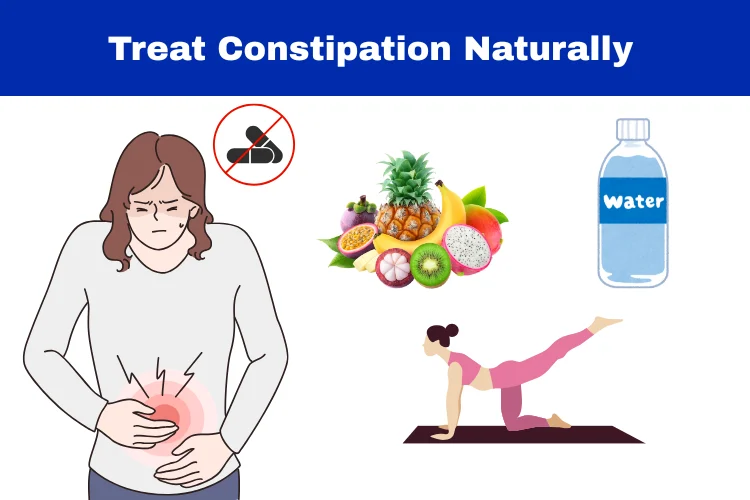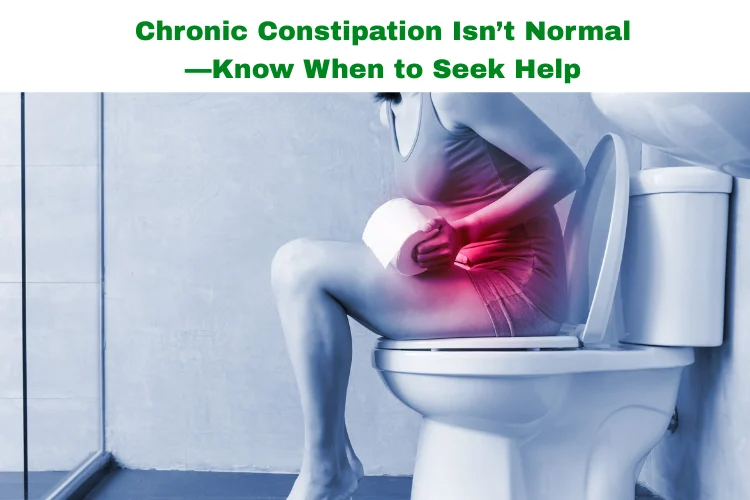Introduction
Constipation is a common digestive issue, but not all cases are the same. Some people experience occasional constipation due to dietary changes or stress, while others suffer from chronic constipation, which can significantly impact daily life. Understanding the difference between these conditions can help determine when medical intervention is necessary.
Learn more about constipation in children here.
Table of Contents
What Is Occasional Constipation?
Periodic constipation is a transient ailment brought on by things like:
- A diet low in fiber
- Dehydration
- Absence of exercise
- Travel or stress
- Some drugs
Signs of Periodic Constipation
- Few bowel movements (less than three a week)
- Dry or hard stools
- Straining when having a bowel movement
- Short-term discomfort or bloating
How to Handle Periodic Constipation
- Eat more fruits, vegetables, and whole grains to increase your intake of fiber.
- Keep yourself hydrated: To make stools softer, drink lots of water.
- Regular exercise promotes bowel movement.
- Create a routine: Make an effort to use the restroom every day at the same time.
What Is Chronic Constipation?
Chronic constipation is a persistent condition that lasts for weeks or longer and does not improve with simple dietary changes.
Causes of Chronic Constipation
- Underlying medical conditions (e.g., IBS, diabetes, thyroid disorders)
- Neurological disorders (e.g., Parkinson’s disease, multiple sclerosis)
- Pelvic floor dysfunction
- Long-term use of laxatives
- Poor gut health
Symptoms of Chronic Constipation
- Difficulty passing stools for three months or longer
- Straining and discomfort with most bowel movements
- Feeling of incomplete evacuation
- Abdominal pain and bloating
When to See a Doctor
You should consult a doctor if:
- Constipation lasts longer than three weeks.
- There is blood in the stool.
- Severe pain or weight loss accompanies constipation.
- Over-the-counter laxatives do not help.
- There is a sudden change in bowel habits.
Treatment Options
Medical Therapies
- Laxatives: Fiber supplements, stool softeners, stimulant laxatives.
- Prescription Drugs: Such medicines include lubiprostone or linaclotide for extreme cases.
- Biofeedback Therapy: Retrains one’s pelvic musculature.
- In rare circumstances, surgery may be required for anatomical issues.
Natural Remedies
Probiotics: Would boost the gut health and would aid digestion.
Magnesium Supplements : Would only help in the natural process of softening stools.
Herbal Teas: Peppermint or ginger tea would ease digestion.
FAQs
1. What are intermittent and chronic constipation?
Occasional constipation lasts for a short duration and is often due to diet or lifestyle alterations, while chronic constipation lasts for the greater part of weeks or months and may need some medical attention.
2. Can chronic constipation lead to any other diseases?
Yes, outright untreated constipation may eventually lead to hemorrhoids, anal fissures, and in more serious scenarios, fecal impaction.
3. What should one eat for constipation relief?
Fibrous foods like oats, prunes, apples, and leafy greens help in digestion and ward off constipation.
4. When should you be worried about constipation?
If the constipation lasts more than three weeks, it’s painful, or there is blood in the stool, talk to your doctor.
5. Can stress trigger constipation?
Yes, stress can affect gut function leading to temporary or chronic constipation.
6. Are probiotics good for constipation?
Yes, probiotics help maintain a healthy gut microbiome that will subsequently promote regular bowel movement and digestion.
Conclusion
Some occasional constipation will hardly disturb daily living but chronic constipation may signal health problems. Symptoms should be recognized when the patient has to decide when to consult a doctor for assessment and treatment for healthy digestive patterns.
If the constipation persists despite lifestyle changes, it should be evaluated by a doctor who can recommend treatment options.




